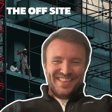Introduction to China's Yolong Zambo Dam
00:00:00
Speaker
And for those that are keeping track of sizes of dams, the largest dam in China prior was the Three Gorges Dam, which was a 10-year build.
00:00:11
Speaker
um And the Three Gorges Dam produces the UK's annual electricity capacity, and this is three times the size of that. it gets It always gets confusing with gigawatts and all the other expressions that are used to measure output. But yeah, so it's three times the size of the three gorges of a dam, which we previously discussed in the mag. That's already huge.
00:00:35
Speaker
For context, this dam does what 20 Hinkleys would do, or 1,500 wind turbines. So what that one dam, the UK, would be fine forever, the amount of electricity it generates.
Episode Introduction: Mega Dam and Project Strategies
00:00:54
Speaker
Welcome back to the Offsite Podcast. I am Jason Lansini, joined once again by Carlos Cavaglio. And today we are talking ah China's enormous mega
Strategies for Mega and Giga Project Delivery
00:01:05
Speaker
ah We're going to dive back into ah the report on mega and gigaproject delivery and talk about the proposed ways to have smooth, uneventful delivery of mega projects. And then we're gonna dig in into some LinkedIn conversations about the strategy for construction technology go to
Cultural Anecdotes: Air Conditioning in Germany
00:01:28
Speaker
market. Carlos, how are you mate?
00:01:30
Speaker
Yeah, good thanks. How are you doing? Wonderful, can't complain. In a quite warm, little little bit sticky, little bit little bit sticky ah Germany today. It'd be nice, it was like a good five degrees cooler.
00:01:45
Speaker
That's why you moved from Australia, it was the cool weather, right? Yeah, but I just discovered that no one has an air conditioner in this country. Yeah, we don't have that. We deal with that when it happens and that's pretty much the routine.
00:01:58
Speaker
We Panic purchased an internal portable air conditioner a few weeks ago and that has been a game changer. Anyone that comes and visits us has been like, whoa, this is way better than sitting in a room sweating all over Is that the setup on the window with the permanent vent and everything like that just a standalone? No, this is like, it's like a standalone unit on wheels that you like connect in under your window, like with a little venti hose.
00:02:24
Speaker
Venti hose. Yeah, that's the technical term. um And it is, it's gone 24-7. It's probably been doing more than 24-7. Highly recommended. Can't remember the brand. Don't know if we'll get, if I could mention it and get a free one, but.
00:02:39
Speaker
yeah Yeah. I do the same thing every year, which is the day that we're sweating. I go, we could probably do one of these units and they're sold out. And then we wait a full year till that happens again. And then it's sold it out again.
00:02:51
Speaker
So and yeah yeah maybe it's on the Christmas list this year. If we move back from Germany, I'll happily let you come and drive to Germany and collect this one. Thanks. That'd be way cheaper than buying one here.
Engineering Feats and Challenges of Yolong Zambo Dam
00:03:03
Speaker
yeah Right, let's dive in. So the first topic of the list is a project that we were talking about throughout the week when we saw the recent news that China has commenced work on this unprecedented massive mega dam, the Yolong Zambo Dam. which is ah combination of 60 gigawatt of capacity.
00:03:27
Speaker
It requires 12.5 miles of tunnels through Tibet's deepest canyon, just 30 kilometers from the disputed China-India border.
Geopolitical and Environmental Impacts of the Dam
00:03:37
Speaker
And the goal is to target to produce enough clean electricity to power 300 million homes.
00:03:46
Speaker
So there's a lot built into this, but it is a a massive engineering feat. It's the largest dam ever built ah by some order of magnitude, I believe. And for those that are keeping track of the sizes of dams, the largest dam in China prior was the Three Gorges Dam, which was 10-year build.
00:04:06
Speaker
um and the Three Gorges Dam produces the UK's annual electricity capacity, and this is three times the size of that. it gets It always gets confusing with gigawatts and all the other expressions that are used to measure output, but Yeah, so it's three times the size of the Three Gorges Dam, which we previously discussed tonight that's already huge.
00:04:30
Speaker
For context, this dam does what 20 Hinkleys would do or 1,500 wind turbines. So what that one dam, the UK would be fine forever, ah the amount of electricity it generates.
00:04:43
Speaker
Yeah, like it's game changer and you can see why why they're going for it.
Engineering Challenges in the Himalayas
00:04:47
Speaker
As much fossil fuels that China does burn, they're actually super ambitious on the clean energy front.
00:04:54
Speaker
um And obviously that's a good, strong, long-term mindset of um invest now for ah almost free energy for a long time. There's a massive knock-on effect to obviously wildlife.
00:05:05
Speaker
They're basically building a dam in the Himalayas um and ah in Tibet. So it's it's definitely a give and a take to summarize that.
Project Costs and Future Energy Needs
00:05:16
Speaker
We want clean energy, but at what cost? Argument. It's the actual area itself is quite interesting. So they've they've chosen this spot, the deepest canyon on Earth, and the elevation drop is 2,800 meters 600 meters. So you can see why they've chosen that location. Yeah. Yeah.
00:05:32
Speaker
Yeah, there's Indian Bangladesh. maybe just to play back for people that most people probably know, but the reason why the height drop matters is that's the potential energy. Basically, you're allowing water to travel down that height. That's how you generate maximal electricity from a dam. It'd be really nice knowing that this nice fresh mountain water coming down the hill has actually been through a couple of turbines.
00:05:59
Speaker
on its way through. To add a bit more context, its ah its projected cost is one hundred and approximately $140 billion US dollars equivalent.
00:06:10
Speaker
And they started construction last week and planned to commission it in 2033. It's actually really efficient as well, use of money. ah So that was 20 Hinkley's. 20 Hinkley's would cost $800 billion. $4 trillion.
00:06:25
Speaker
four trillion dollars Pound for pound, it's ah yeah it's a sensible use of money if we purely look at the energy it's generating and not the the broader effect it's having on ecology and other well countries and everything else. so And what's the bigger picture here, right? Like there's this big geopolitical race happening that is all about AI and the ability to harness the pale of AI and the the idea of like AI is effectively a...
00:06:58
Speaker
the capacity of of of what people can do with AI is is now and will increasingly be in the future limited by the ability to find energy to to power ah these data centers.
Mega Project Success Strategies
00:07:14
Speaker
definitely a race happening and ah building the world's biggest dam ever that is ah three three times bigger than the one that could have powered the whole of the UK Pretty big power move in the world of make energy.
00:07:31
Speaker
Yeah, it's a statement piece, that's for sure. Yeah, a massive geopolitical chess piece that is going to result in a one-of-a-kind impressive construction project in an incredibly difficult location to build, as you pointed out. Nowhere near any really like many people or any population. And an earthquake riddled zone too, just to add complexity.
00:07:55
Speaker
So yeah, it's like it's going to be doing construction on hard mode, mega, mega, mega construction on hard mode with a timeline for i someone should do the math. We should do the math on like um like average cost of construction, like mostly it'll be earthworks and concrete and tunneling. They're like the three. that During the the the heavy civil space, they're going to be doing like 10 to 20 billion pounds a year.
00:08:19
Speaker
That's crazy spend project. Mostly like digging, drilling holes and pouring concrete. That's that's insane. Yeah. You'd struggle to have on how you would even think about spending that sort of money.
00:08:30
Speaker
always But how much actually like concrete is being put in the ground. I haven't done that. I need i should have done the research before this. There's going to be tens of thousands of people. Massive. There's going to be the the amount of kit you're going to need.
00:08:41
Speaker
Well, i no, i think I read i think i read that um that Three Gorges Dam resulted in over a million jobs. A million? A million jobs. Now, someone will write to me and tell me that was rubbish, but I swear when I was doing the preparation that Three Gorges Dam did generate over a million jobs.
00:09:01
Speaker
Killer. And again, we're three times bigger. So this is at least three million jobs. Well, how many jobs is Hinkley producing? So like 10 to 15,000 or something? Yeah, I would have guessed something like that. How is a million people being put to work on a dam?
00:09:14
Speaker
I mean, it must be the ripple effect of the supply chain. Like, everything that enables this dam to be produced so that it will be across the country. Concrete. Not a million people turning up at the the swipe in the morning.
00:09:26
Speaker
One by one clocking Stone by stone. It's all that Egypt egypt style. Yeah, we got any plan because we've got a million people. Just...
00:09:38
Speaker
Pyramids part This is definitely a massive geopolitical chess piece and an incredible project to to keep an eye
Key Factors for Project Success
00:09:46
Speaker
on. Speaking of massive mega projects and complex projects, last week we dove into a report that was released by Mace where I think the report was the future of major program delivery where they had done, I guess, a look into mega and giga projects in different parts of the world.
00:10:07
Speaker
ah There are a bunch of interesting stats and numbers that we dove into last week. Alongside that, um the report then details 10 pillars of successful collaborative delivery of these mega and giga projects.
00:10:21
Speaker
um So I thought we could run through what they are and then maybe discuss our experience in relation to some of these and and what we would see on a day-to-day basis. So I'll rattle through them off the back. So outcomes focused, uncontroversial. I won't give comments on each one. Outcomes focused, focused an integrated one-team approach.
00:10:42
Speaker
Three, shared risk and reward framework aligned to outcomes. Four, highly collaborative in every sense. Five, knowledge transfer and capability building.
00:10:53
Speaker
Six, long-term relationships. Seven, look beyond leadership for key decisions. Eight, high capability consultant team with breadth of involvement. mean Suspiciously self-serving.
00:11:11
Speaker
Nine, trust and transparency. 10, integrated technology and processes. I think the highlight here is sliding in the one that is higher us at eight. That feels like a genius play.
00:11:25
Speaker
Because if you put it at 10, it'll be really obvious. You can't open
Importance of Clear Objectives and Collaboration
00:11:30
Speaker
it. Oh, please. Higher us. Number nine. it in the middle.
00:11:35
Speaker
And they'll never know. It's like... By cornflakes. Throughout the document. Yeah. No, I'm taking the piss. It's actually a really good report.
00:11:50
Speaker
Recommend ah ah people ah read it. Yeah. Were there any bits that jumped out to you in in those 10 and in the deeper dive against those 10? Yeah, so first reading it, it kind of felt like a bit of a manifesto, which is like the kind of thing that that sort of everyone will claim to do, but no one really does to like the degree that everyone wants to be doing it at. It's quite interesting because it's like peeking under the hood of probably what the pitch looks like from these consultants to the client.
00:12:20
Speaker
I've never seen witnessed, observed what that phase of a project looked like, but how a tender team functions to win a job like that, which is coming in and providing these consultancy services. So it's quite interesting.
00:12:31
Speaker
I saw this post on LinkedIn the other day, which was like, um owner hires project delivery consultant for 4% of project fee in order to avoid potential cost overruns of 4%.
00:12:48
Speaker
Oh, wow. So wait, is the pitch saying it will only be 4%, which is our cost? So you're removing the the potential bigger risk above 4, but remove any upside from not having the 4?
00:13:00
Speaker
Pass. Yeah. Like a strong theme throughout is really like empowering the client. um So it's kind of acknowledging that the client doesn't necessarily have the capacity, the skills, or the...
00:13:14
Speaker
Yeah, their knowledge to run these projects. And that's like a clear theme throughout, which is like... This is like the pitch to the client. Program design is quite an interesting one. It's like the systems thinking to large schemes. Historically, isn't done that well. If we think about these major schemes, like now with HS2 that goes through these resets because their central view of the world is kind of out of touch from what's actually happening on the ground. So when you stack up changes over time, you get these big blowouts.
00:13:44
Speaker
Is that one a bit more sort of wishlist item than something that's actually being... like sort of tackled or done to a level of degree or add to a degree at the moment.
Cultural Dynamics in Project Teams
00:13:53
Speaker
i i had my i had my like hat on from thinking about previous projects um and and ones that we've interacted with as I was reading through. And immediately, even just from the first one, like outcomes focus. Yes, it sounds like a buzzword, but I was reflecting on the importance of ah special and very large projects where there are lots and lots and lots of people making lots and lots and lots of decisions every day that can't all make it up to key people.
00:14:18
Speaker
yeah um And how valuable and impactful and important the like core set of objectives that are almost like the mantra of the of the project are in how people act at a micro level. I was reflecting on Crossrail where at a very micro level, we used to get into lots of situations where people quality of outcome, especially like visual impact of outcome from an architectural point of view was at odds with schedule, practicality of delivery.
00:14:51
Speaker
And there was like an ethos of like the the quality and the impact and like what it would look like and feel like being like quite a high thing that was was like a priority across of Crossrail.
00:15:04
Speaker
And there wasn't really you know, I think if we had like a clear manager was repeated constantly about like value for money and timeline. Yeah, every, all of my experience was focused around like milestones, like six or more conditions or handovers and things like that.
00:15:20
Speaker
And there was never this flow down of like anything that's even alluding to the how other than this is our milestones, everyone do their jobs to get there. Yeah. outcome that isn't a mark on a program was definitely missing.
00:15:32
Speaker
Like how should this team function? what what what what should we do doing differently to get there? What are the principles and what are the things that we value when we hit decisions where people, two people from, you know, the client or the contractor or the designer, know, when we are trying to solve a problem, what are the like things we should value?
00:15:49
Speaker
um And it felt like the quality and the impact of the outcome was like the most important thing. And it was very hard to um to push back or to to think about value for money and and time of things as a result.
00:16:06
Speaker
Whereas I've been on other projects where value for taxpayer was like one of the key mantras and you just saw it turn up in every meeting. You know, when people are thinking about how they make a decision.
00:16:18
Speaker
So I think that like outcome focus thing actually has, it feels like a bit soft and a bit wishy-washy, but I think if you repeat it as a leader every single day, it does impact on the margin. It's not to say it's going to solve every problem, but it does impact on the margin how people make decisions.
00:16:34
Speaker
Yeah. Sort of secondary to that, um the point that was around collaborative, what do they label it as? Collaborative in every sense. I am, yeah. Collaboration was, again, that buzzword that everyone got sick of hearing. And I think everyone's view on collaboration was just sharing information.
00:16:50
Speaker
And this sort of dug into more like it should be collaborative to the sense of we're all mutually trying to get to these outcomes. So how can we support each other to get to an outcome that might not be your outcome, but someone else's outcome?
00:17:02
Speaker
And that was definitely missing in what I've seen in projects. Collaboration was like sharing and talking openly, not actually aligning on going back to the outcome points on the thing that we're trying to achieve. And then,
00:17:13
Speaker
one organization or individual sacrificing something they need to help another one because that's more important, is definitely missing.
Trust and Transparency in Mega Projects
00:17:20
Speaker
Yeah. I think the the the peer to that is that kind of like integrated one team approach.
00:17:26
Speaker
Another hallmark of many large schemes is ah very quickly commercial disputes driving relationship, like this fractures, we're hiding info, we're each doing our own thing, even though we technically are all in the same office.
00:17:43
Speaker
And yeah you know like you do kind of the like structural things, like you put all of the team in one office, but if there isn't a one team culture, everyone's in the same office, but i having very special meetings about the things that the other people can't hear.
00:17:58
Speaker
yeah And so, yeah, some of the projects that ah have been really successful from ah ah ah large mega project perspective that I've had the pleasure of observing really nailed this one team approach, bringing everyone into, you know, even like daily supervisors meeting and the three week look ahead or the six week look ahead meeting, that being in everyone in and not hiding from say a client that we're behind on something all those things matter because once you start one, I think they all turn, you know, once you hide one thing or you fail to disclose one thing, I think it's like a domino that falls on the project.
00:18:37
Speaker
Yeah. And friction builds over the time. So a lot of this points back to really culture rather than like rules or yeah the 10 golden rules of how to deliver a construction projects is really like how a team should operate. There's the trust and transparency item, which is like nine and Yeah, as you go through a project, everyone knows that like it's all happy at the beginning, but then you start doing favors for the client by doing work that they haven't instructed. And then you've got supply chain who are operating at risk and you're not agreeing conversation events and ah you obviously naturally thinking commercially here.
00:19:10
Speaker
And that trust degrades over time to a highly sort of tense and volatile relationship across the board. So, Yeah, tackling that on a major scheme from beginning to end is like, that's super important. And I haven't seen a good example of it where projects have actually like finished on a high and the high isn't we've finished. It's
Leadership and Communication for Success
00:19:32
Speaker
like, that was a wicked job that everyone ah like contributed to and enjoyed the process.
00:19:37
Speaker
And yeah, and it probably goes back to the third one, which is this shared risk and reward framework. Because if I think about every every project that was successful in that sense, I think everyone kind of made money as well.
00:19:48
Speaker
And usually the contractor makes money by just finishing early. Like there's usually not a lot of like, You can get an outcome, like if I was to bucket outcomes of of major projects, the one where everyone's unhappy, you barely make money or you lose money, you're usually late and there's a bunch of disputes.
00:20:07
Speaker
That's a potential outcome. I think there's the other outcome, which is you finish late, the client isn't particularly happy, but the contractor makes money because of, you know, playing a very contractual game, the contract being somewhat in their favor.
00:20:21
Speaker
Yeah. But it's, you know, that's probably like reputationally damaging if you think about it from a long term perspective. Yeah. The projects where people are actually happy and the project is successful, it's almost always because the the contractor had a theory about how the project could be delivered quicker.
00:20:40
Speaker
The client and everyone bought into that delivery method of trying to finish the project quicker, clearing roadblocks to make it happen, all those sorts of things. um And it was delivered quicker. And by the nature of it being delivered quicker, the contractor made more money than they originally planned.
00:20:58
Speaker
The clients had because it was delivered. Like everyone usually wins. So it's like, yeah, if everyone just lined up on finishing this thing as early as possible, all that overhead costs disappear. Like it it really is just as simple as that, like aligning on getting this thing done as quickly as possible.
00:21:12
Speaker
Yeah, yeah. Yeah, for sure. Which seems like a stupidly dumb thing to say. Because that's so obvious. Just finish early and everyone's happy. But it's so obvious, but it's like it's it's so often deprioritized in very, very large projects.
00:21:25
Speaker
Yeah. But you can imagine, though, the group of individuals that like to even set these objectives or kick off these or outcomes and then kick off the process.
Motivating Project Teams
00:21:35
Speaker
Once people are in their day to day jobs, even an individual on a project, a lot of these people don't give a shit if the company is going to get bonus for finishing on time.
00:21:43
Speaker
they could Even if they're employee, let alone like a contractor on a day, right? They're just there to make money and they want like an enjoyable job. So keeping the team incentivized is probably way harder than like management being incentivized to deliver results.
00:21:56
Speaker
How would you do that by the way? I think that's an interesting discussion. Yeah, we had the conversation a while ago around what made a project a great project. And we had one project where everyone said, anyone that worked on that project will say it was their favorite project.
00:22:09
Speaker
And it's hard to, I don't think you could like write a playbook on how you could recreate that. But it was ah it was like ah a lucky combination of like people who were ambitious, but also fun and social on a contract that was...
00:22:24
Speaker
But like it was a big mega scheme across around. It's exciting. it's it's yeah It's one that's in the news. Decent supply chain. And it's how do you create that culture where everyone enjoyed going to work? They were high performing and also socialized together.
00:22:37
Speaker
Yeah. how How you actually control that, I don't know. I think it's a combination of leadership and luck, probably. It's much easier if there's an opportunity to deliver the project early, make money and everyone and and then share the benefit of that win.
00:22:50
Speaker
It's hard if the job is very hard from the start because the tender like sets you off on a bad way.
Shared Alignment and Benefits
00:22:56
Speaker
yeah um But I've seen lots of jobs where yeah there's like this shared alignment of incentives, risk and reward, and that...
00:23:04
Speaker
Many people on the project are tied to, you know, money made on the project. Is that like that kind of like everyone shares in some of the outcome thing when the job job has the opportunity to come in early.
00:23:16
Speaker
It does have a ah big hand in that, but it's just it's incredibly different story if the job is off the pace early because of. And i from a commercial sense, like ah I remember that job, our commercial manager knew exactly where the opportunity was in the job to ensure that the project made money. An unorganized person would be like, right, we're starting at a loss.
00:23:37
Speaker
We need to claw back money from wherever we can. And that immediately is going to set you off on the wrong foot in relationship building. But if we got alignment on where the opportunity is and we work with the client and the supply chain to realize that opportunity, then that is a win-win situation. So yeah, it goes back to leadership and how they actually manage. Leadership and communication, isn't it?
00:23:54
Speaker
Yeah. Yeah. Yeah. which just I just said two buzzwords. I feel ashamed. It's a Michael Scott poster. yeah ah Actually, it's all about leadership, communication and and collaboration and mainly just some synergies. If we can get that nailed, we're on a winner.
Construction Technology Marketing Strategies
00:24:10
Speaker
Remember to hire the consultant.
00:24:13
Speaker
yeah it's God, I hate myself. Final topic with roughly 10 minutes to go. we ah we read a couple of posts on this topic recently and we were discussing offline this varied approach to how construction technology like approaches a market.
00:24:32
Speaker
And largely, if I was to bucket them, there is this kind of cohort of of companies who will directly you know commercialize their products. So they will sell have their own marketing and sales team and customer success team and deploy and all that sort of stuff.
00:24:48
Speaker
And then there is this other cohort who leverage like channel partners, so existing maybe technology companies, resellers or consultants in a market to effectively be the seller of of the technology and maybe even the deployer of the the technology.
00:25:06
Speaker
ah There is like pros and cons to this from the technology company side. And I think there are pros and cons probably also from the customer side.
00:25:16
Speaker
I don't know if many of the people listening understand that these are like explicit decisions that ah that kind of frame how a ah company operates and how a technology operates.
Sales Channels: Direct vs Channel Partners
00:25:27
Speaker
So Yeah, I don't know if you want to frame up the the different um considerations and pros and cons here.
00:25:33
Speaker
It's hard to know where to start, but um yeah, I guess to frame it, it's if there's a piece of technology that a team is looking to adopt and that piece of technology, for example, comes with a consultant who is there to facilitate the process that uses the technology itself.
00:25:48
Speaker
or the session where people interact with that technology. If we just ignore the fact that there's probably something wrong with that technology, this has a lot of like parallels to like Oracle charging people to view their data. you're You're literally paying someone to be an interface between you and the data that you're creating.
00:26:05
Speaker
and hu So firstly, like it's obviously going to be expensive. As soon you throw in a person who's not going to be cheap because they're not junior, thats That's already like ah its own sort of bubble to think about.
00:26:17
Speaker
But we then get in this really odd spot of um like siloed processes and procedures. You're kind of signing up to the tool or the consultant's way of working.
00:26:29
Speaker
So how does that fit in with the project or the organization ultimately processes? You're kind of buying into that individual and they're working for the long term with like little control because they're going to push everything towards the way that they work because you're investing in in them and as well as the tool, the tools kind of secondary to the person.
00:26:49
Speaker
The idea is quite hard to wrap your head around because Yeah, you're stuck in this mold that someone has pitched and bought into, which could be the decision of one person on the project that hasn't considered the whole project. And it's basically saying, right, this person knows what they're doing. Let's do everything that they say.
00:27:07
Speaker
And we can't operate without them. Um, so you're kind of going all in on that methodology. Uh, I'm trying to say like products and, uh, yeah. like Let's like, yeah. If we zoom out like a little bit, uh, we think about it from the starting from the vendor side, like,
00:27:25
Speaker
Selling technology into construction is very hard. Getting people to take an interest, to want to purchase, to deploy and change behavior is really hard. And the direct approach to that is just like you're signing up for a bunch of hard work, you've got to solve a bunch of problems.
00:27:42
Speaker
And I can see why there is a clear appeal to If I go into a market, there are existing maybe consultants, resellers who have a relationships with potential customers that you they could go in and just sell you your product.
Consultants in Technology Purchases
00:27:56
Speaker
Yeah. And you're buying the service or the outcome or whatever, which is a lot less to think about and manage yourself. So that's a tempting yeah proposition. there's ah There's a clear benefit from the vendor side the to this like channel partner strategy.
00:28:10
Speaker
The tradeoff is you lose contact directly with the customer usually, and so it does potentially hinder your ability to keep developing the product because you just don't have that like feedback loop with the customer that says, I can see how people are using it, I can talk to them, and I can see what's working and not working in the demonstration or in the setup.
00:28:29
Speaker
You just lose that feedback. loop You also lose the control over how the thing is demoed or presented because it's going through a third party. Yeah, your brands, the narrative, the yeah the the connection to the tool. On the flip side, for the customer, ah there is a there's some clear benefits to this approach of like you ah purchasing something that's coming from a a consultant or a vendor you already use.
00:28:53
Speaker
Commercials are already like much easier because they're an established vendor. There is also if they're already working with them and trust them, then you're going to have some like built-in trust to the thing that they're proposing to do.
00:29:05
Speaker
um And that they're probably owning the outcome of it in some way for you. So I want to bring some piece of technology and I work with you on some number of projects doing some sort of consulting.
00:29:17
Speaker
I'll bring this technology in and we'll use this technology to solve some other problem. but But i'm I'm kind of shepherding it through. The flip side is, as you said, like in order for the consultant to do this, there's a relationship usually between the technology provider and the reseller or the consultant where there is some commercial split of ah money.
00:29:34
Speaker
And for it to be both attractive to the technology vendor and to the person that's going to deploy it and do the work, usually that means that it big enough pot of money that both of them get excited about the opportunity, which usually means the outcome is just expensive.
Challenges with Evolving Technology
00:29:50
Speaker
The marginal cost of supplying technology is almost zero, as in it costs almost nothing for a software company to have one additional user or customer. It's almost nothing.
00:30:01
Speaker
And so you'll pay a lot more than nothing. Yeah. If we think about that, Like the entire software game is to be um providing value and relevant, but then to keep up with requirements, with how projects are deployed and and staying staying relevant and staying at the forefront.
00:30:21
Speaker
And by running this model, You've got potentially the contractor, the project team will stay where where, wherever this consultant is not necessarily where the the technology provider is.
00:30:32
Speaker
You've got a technology provider that's probably only getting direct feedback from the consultant, which is incentivized towards their own needs rather than necessarily the needs of the project. So you've kind of got across the board, this, um, slowing down or sort of, dunno what the right term is, but.
00:30:49
Speaker
It's kind of everyone's in many handcuffs in terms of progression because you've got this party that's sat in the middle that's sort of playing the balancing game. If the thing you're selling is a finished product,
00:31:04
Speaker
not even finished products, not the right word word, but like a stagnant output. you know I'm selling a ah rebar chair. Like that rebar chair doesn't get really iterated on.
00:31:15
Speaker
It does make sense to sell that rebar chair through the person that I buy rebar from as a reseller, as a channel partner. I've never seen a rebar chair. Is that sad?
00:31:27
Speaker
ah Leave that one in Olu.
00:31:32
Speaker
but Have you ever seen rebar? Yes. What would you have called the thing that you've just looked up? Prop? Yeah, not a prop.
00:31:43
Speaker
um So i think if if the situation is is you're selling something that isn't like a constantly evolving thing, it becomes an easier proposition to go to a channel partner.
00:31:56
Speaker
But yeah, going back to the customer perspective, like I think if you buy something, there's a strong appeal to buy something where the person you're buying it from is going to deliver the outcome of it, but you you are just paying for both their time the margin they're making on the technology, the margin that the vendor's making on the technology.
00:32:14
Speaker
So it is just like a more expensive outcome.
Episode Conclusion and Listener Engagement
00:32:18
Speaker
And it probably means that you are not getting best in class technology because you're getting the technology that that they have the relationship with.
00:32:27
Speaker
Yeah, for sure. Like i only really considered when I was sort of thinking about this topic, the software side of this sort of arrangement rather than anything physical.
00:32:37
Speaker
But- Bar chairs. No, rebar chairs. Yeah. If you think about even the consultant that is the reseller, the The piece of technology is going to be super established, been around for a long time. So these consultants have not just like found it, but considered ah a read a process, and ah an entire organization around this particular piece of software. So are you always one step behind?
00:32:58
Speaker
We see an example of, we see examples of early stage ones all the time being channel partners for early stage technology early stage software. I normally see that more in the context of like a consultant with an offering that also said like endorses a tool and can help manage that tool or think about reporting.
00:33:18
Speaker
But they're already like a bum on a seat doing a job, not someone there that's purely to facilitate like a tool being used. Exactly. That's what I mean by like, there's some misaligned incentives between you as the customer and the consultant that's like reselling this thing into you because yeah the consultant's um arithmetic is I'm already putting a bum on a seat for Carlos.
00:33:39
Speaker
If I could bring this software and I could juice my margin, I basically can, I'm getting straight bottom line win here. I could probably sell Carlos some more hours yeah plus the technology. Yeah.
00:33:50
Speaker
And I'll be here forever to manage this. um um I'll manage this piece of software for Carlos. So there is like a misaligned incentive. Plus, like I said, you're probably not getting best in class technology because almost no best in class technology goes for a channel partner.
00:34:04
Speaker
Yeah, yeah, yeah, for sure. And there there's huge benefit in like the, we can supplement this tool because we're the experts in say reporting. i I see a lot of value in that because that's the type of thing that the vendor might not want to be heavily involved in and the contractor doesn't have the expertise to do.
00:34:21
Speaker
yeah But as soon as you're required to be there to make the tool work, that's when it starts to grate on me that like the the tools either not fit for purpose or like someone somewhere is like loving your pitch.
00:34:34
Speaker
And it doesn't at that point, it doesn't make sense. So there's a level of engagement that goes from like super helpful to... yeah Yeah, like if basically applying the technology results in you spending more in consultant hours, yeah you probably need to think about it as an amber flag.
00:34:52
Speaker
Yeah, yeah, for sure. Very interesting. right ah We're definitely out of time. ah Great episode, great chat. ah We are, what are we, two away from the big 100 now? Yeah. It took 98 episodes to talk about rebar chairs.
00:35:06
Speaker
Right. Thank you very much, everyone, for tuning into today's show. If you did enjoy the episode, please do think about liking this video or following us on your chosen podcast platform. We really appreciate your support and we'll see you all next week.




















